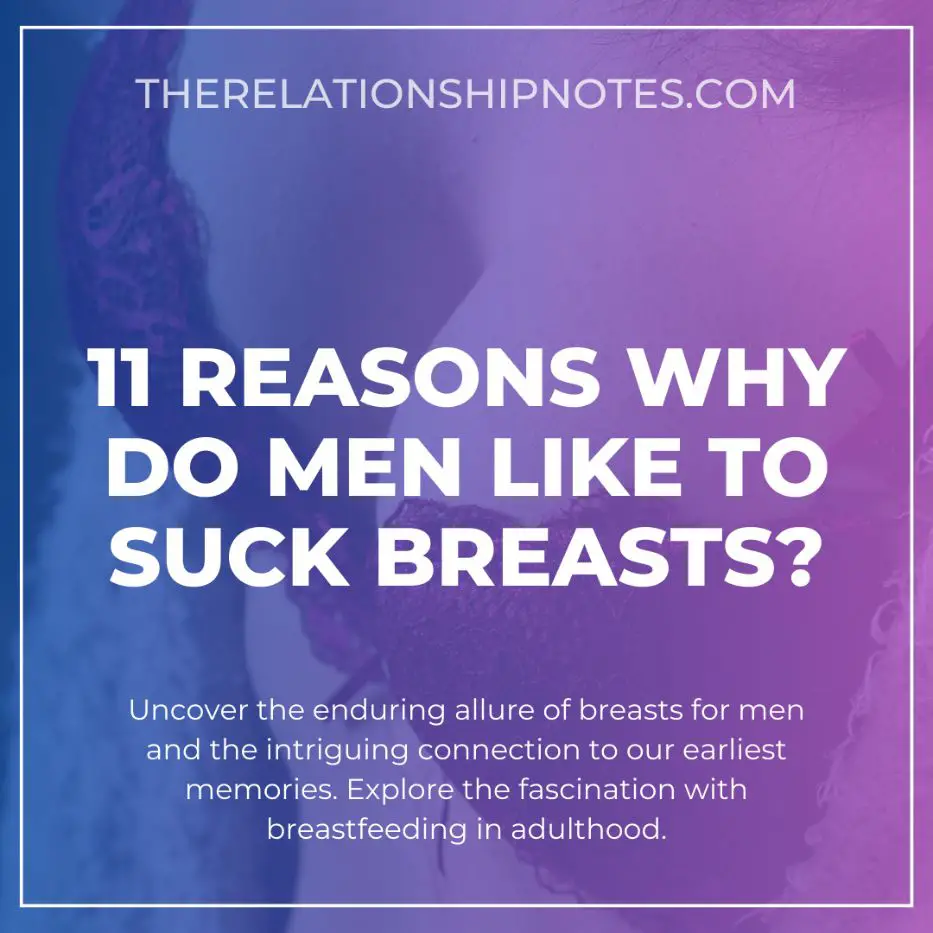Breasts have long been a source of fascination and intrigue, particularly for men.
Table of Contents
The act of breastfeeding is one of the earliest memories we have as infants, which makes it all the more curious why this part of the female anatomy continues to captivate us well into adulthood.
In this article, we will explore the reasons behind men’s love for breasts from a sex and gender studies perspective.
From an evolutionary standpoint, some researchers suggest that men may be drawn to breasts because they signal fertility.
Full and perky breasts are seen as a physical manifestation of reproductive potential and can thus serve as a visual cue for males seeking mates.
Breastfeeding also releases oxytocin in both mother and child, creating feelings of bonding and attachment.
It is possible that this hormonal connection between breast stimulation and emotional closeness could play a role in why men find pleasure in sucking on nipples during sexual activity.
However, there are certainly other cultural factors at play when it comes to our obsession with breasts, which we will delve into further throughout this piece.
Summary
- Men’s fascination with breasts may stem from evolutionary factors, as they can signal fertility and reproductive potential.
- Breasts hold cultural significance, with different societies celebrating or stigmatizing them based on cultural norms and beliefs.
- Breast stimulation during sexual activity can create pleasure, intimacy, and release hormones like oxytocin, fostering bonding between partners.
- Breast fetishization and objectification of women’s bodies have historical roots and perpetuate harmful gender stereotypes.
- Media plays a significant role in shaping ideals around breast size and attractiveness, but there is a growing movement towards body positivity and inclusivity.
1. The Cultural Significance Of Breasts
Breasts have been a cultural symbol for centuries, and their significance varies from one society to another.
In some cultures, breasts are celebrated as a sign of fertility and beauty, while in others, they are seen as taboo or shameful.
For instance, breastfeeding taboos persist in many societies where women are expected to cover up or hide their breasts when nursing.
Breast artistry is also prevalent in different cultures worldwide.
Some tribes use scarification techniques to create intricate patterns on the breast skin; others adorn them with jewelry or paint.
These practices highlight the importance of breasts not only as functional organs but also as symbols of femininity and identity.
Moreover, mainstream media often sexualizes breasts, perpetuating gendered stereotypes that reinforce patriarchal norms.
This objectification can lead to misconceptions surrounding male attraction towards female breasts.
It’s crucial to note that the fascination with breasts isn’t universal amongst all men and instead stems from socially constructed ideas about what is attractive or desirable.
More Articles:
Why Do Men Like Submissive Women
2. Evolutionary Theories Behind Breast Attraction
Having explored the cultural significance of breasts, it is now important to dive into the evolutionary theories behind breast attraction.
Evolutionary psychology suggests that there are biological reasons for why men are attracted to women’s breasts.
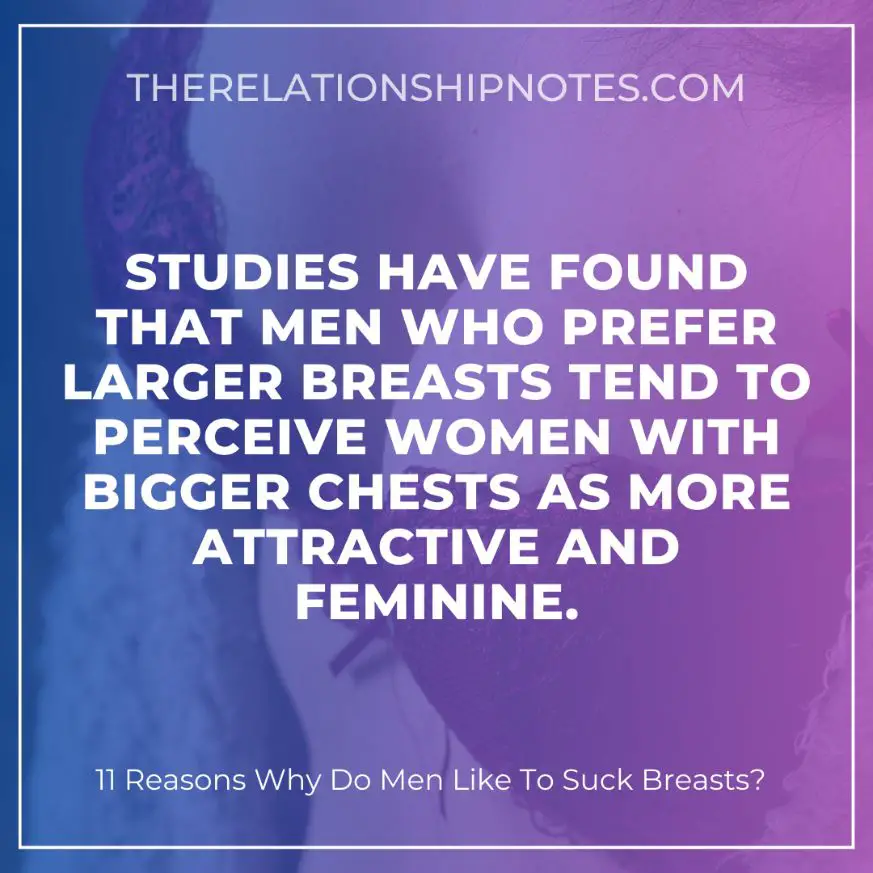
Breast size and shape may signal fertility and indicate a woman’s ability to provide nourishment for offspring.
This theory is supported by research showing that during pregnancy, lactation, and menstruation, a woman’s breasts undergo physical changes that can be sexually appealing to men.
Additionally, studies have found that men who prefer larger breasts tend to perceive women with bigger chests as more attractive and feminine.
Another explanation for this phenomenon is sexual selection.
Sexual selection refers to the process in which certain traits become more prevalent in a population because they are preferred by members of the opposite sex.
In other words, if men find large breasts desirable, then over time, women with larger breasts may be more likely to pass on their genes than those with smaller breasts.
Four Possible Reasons Why Men Like Sucking Breasts:
- It feels pleasurable
- It creates intimacy between partners
- It can lead to increased arousal
- It can release hormones like oxytocin
In conclusion, while cultural beliefs certainly play a role in our perceptions of breasts, evolutionary psychology suggests that there are deeper biological reasons why men are attracted to them.
As society continues to evolve and attitudes towards sexuality change, it will be interesting to see how these factors continue to influence our understanding of human behavior and desire.
3. The Role Of Fertility In Breast Preference
It is not uncommon for people to wonder why men have a preference for breasts.
From an evolutionary perspective, one explanation could be that it serves as a fertility indicator.
Breasts develop during puberty due to hormonal responses and signify that the female body is capable of reproduction.
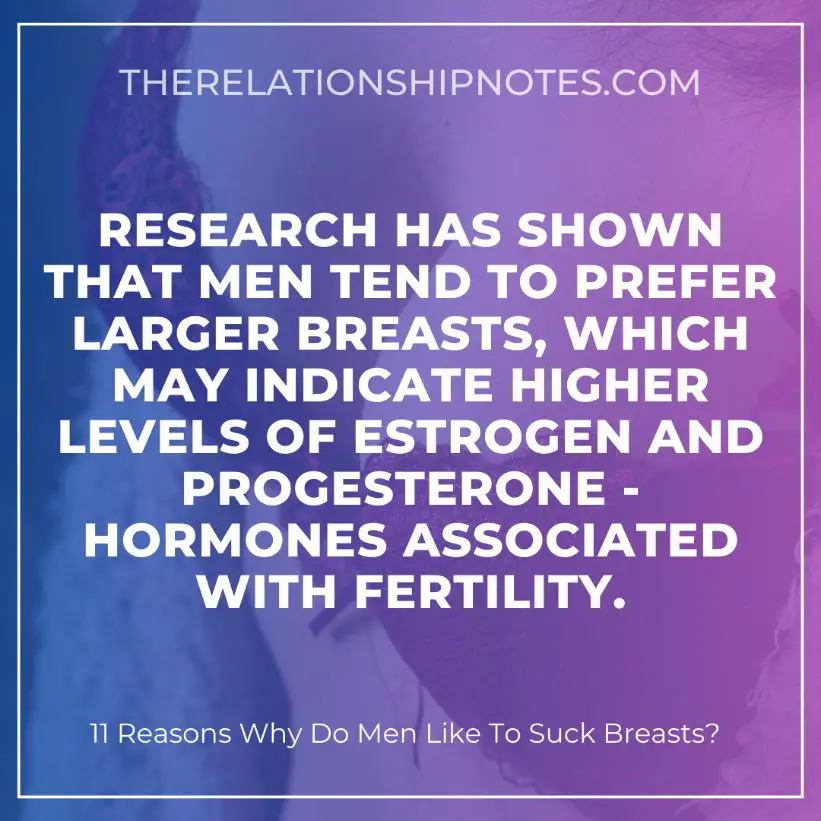
Research has shown that men tend to prefer larger breasts, which may indicate higher levels of estrogen and progesterone – hormones associated with fertility.
This preference can also vary based on the menstrual cycle phase; during ovulation, when women are most fertile, men exhibit stronger preferences for breast size compared to other phases in the menstrual cycle.
However, it’s important to note that this theory alone cannot fully explain why some men find breasts sexually arousing while others do not.
Attraction is multifaceted and influenced by various factors such as individual experiences and cultural norms.
Nonetheless, understanding how fertility indicators play a role in sexual attraction can provide insight into our evolutionary past and present-day behaviors toward sexuality.
Overall, while there isn’t a definitive answer as to why men like to suck breasts, research suggests that it may stem from biological cues related to fertility.
It highlights the complex interplay between biology and culture in shaping human behavior towards sex and desire.
4. Breastfeeding And The Release Of Oxytocin
Did you know that breastfeeding not only provides essential nutrients for a growing infant but also releases the hormone oxytocin in both mother and child?
Oxytocin, often referred to as the “love hormone,” is associated with feelings of bonding, trust, and relaxation.
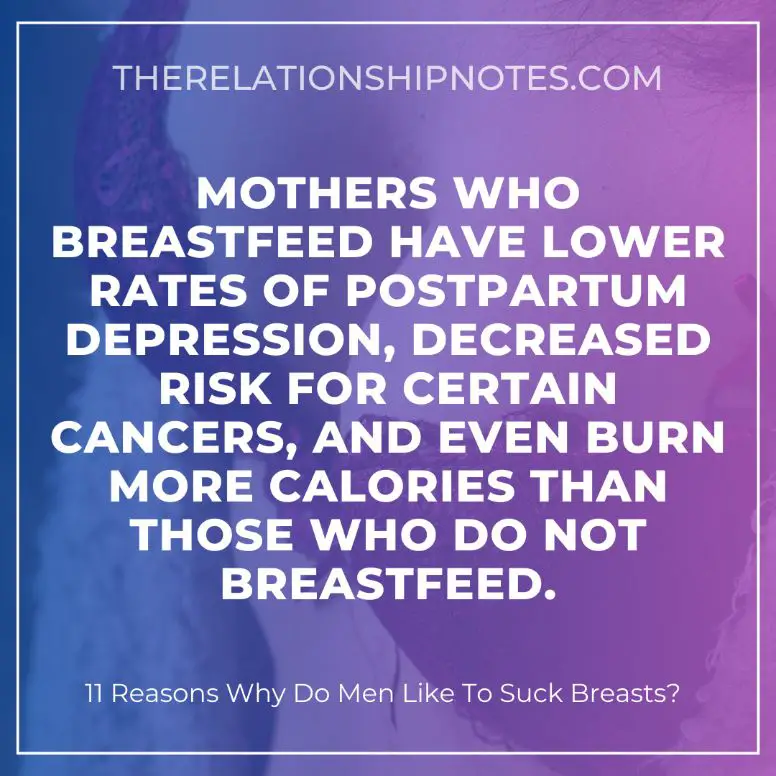
It’s no wonder why many women report feeling a sense of euphoria while nursing their babies.
The release of oxytocin during breastfeeding has been linked to numerous benefits for both mother and child.
For infants, it can lead to improved digestion, better sleep patterns, and reduced risk for infections and illnesses.
Meanwhile, mothers who breastfeed have lower rates of postpartum depression, decreased risk for certain cancers, and even burn more calories than those who do not breastfeed.
Despite these benefits, there remains a significant social stigma surrounding public breastfeeding.
Women are often shamed or made to feel uncomfortable when nursing in public spaces.
This attitude perpetuates the false notion that breasts exist solely for sexual pleasure rather than fulfilling an important biological function.
To combat this stigma and promote the health benefits of breastfeeding, it’s crucial that we continue to educate ourselves on its importance and advocate for policies that support nursing mothers.
By normalizing breastfeeding in public spaces and providing resources for new mothers, we can create a culture where all parents feel supported in making the best choices for themselves and their children.
Benefits of Breastfeeding:
- Improved digestion
- Better sleep patterns
- Reduced risk for infections/illnesses
- Lower rates of postpartum depression
- Decreased risk for certain cancers – Decreased risk for obesity and type 2 diabetes in both the mother and child.
5. The Psychological Connection Between Breast Stimulation And Bonding
Breastfeeding and bonding are inextricably linked, yet the connection between breast stimulation and emotional attachment is not often discussed.
Breastfeeding releases oxytocin, a hormone that promotes feelings of love and connection between mother and child.
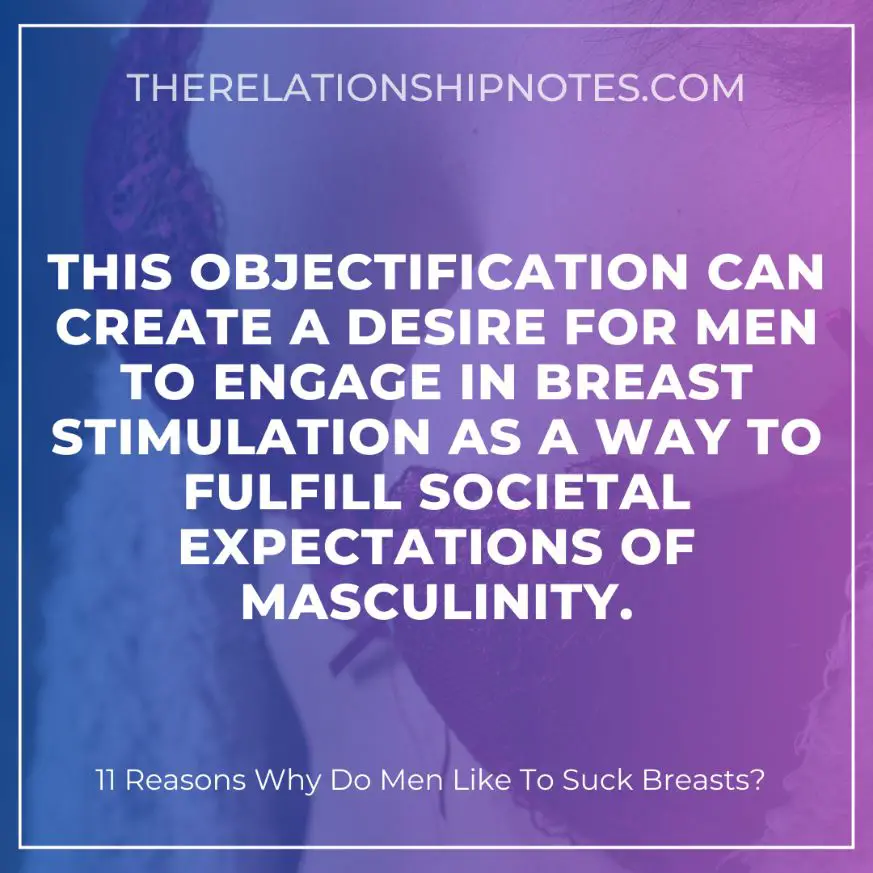
However, research has shown that oxytocin is also released during nipple stimulation in both men and women.
The cultural norms and expectations surrounding breasts may play a role in why some men enjoy sucking them.
Breasts have been sexualized in many cultures, leading to the belief that they exist solely for male pleasure.
This objectification can create a desire for men to engage in breast stimulation as a way to fulfill societal expectations of masculinity.
Additionally, breast stimulation can provide a sense of comfort and intimacy for both partners.
The act itself requires close physical proximity and creates an opportunity for eye contact and nonverbal communication.
For some couples, engaging in mutual breast play can strengthen their bond by deepening their emotional connection through physical touch.
It is important to note that every individual’s relationship with breast stimulation varies greatly based on personal preference, experience, culture, and upbringing.
While there may be psychological factors at play when it comes to why men like to suck breasts, ultimately this behavior should always occur within consensual boundaries and with respect for one another’s autonomy.
6. The Historical Context Of Breast Fetishization
As mentioned in the previous section, breast stimulation has been linked to bonding and intimacy between partners.
However, breast fetishization takes this connection to a different level.
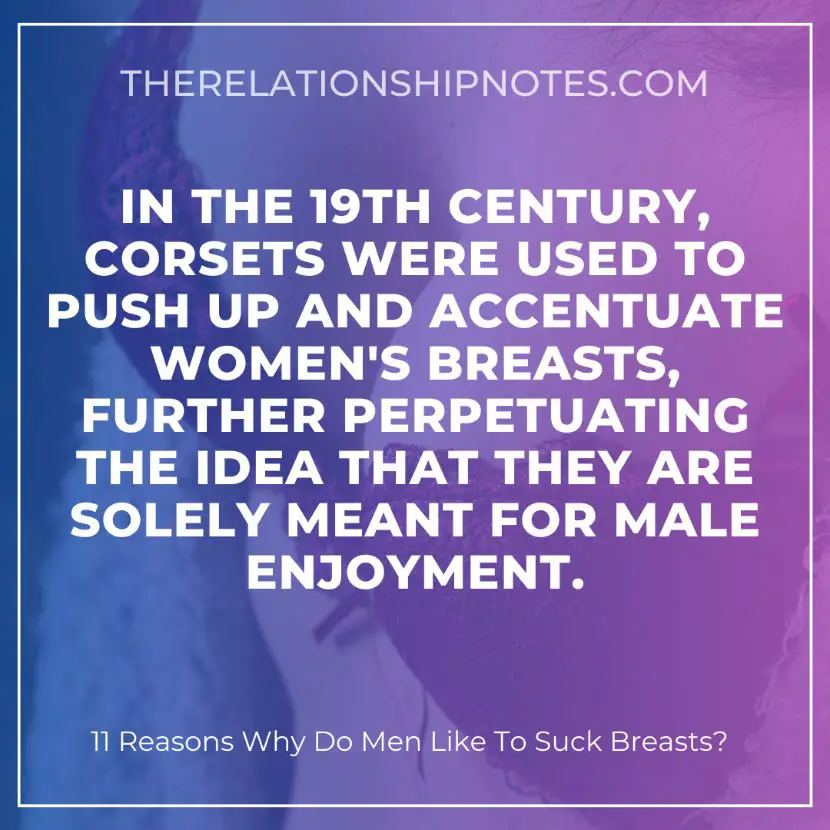
The historical context of breast fetishization can be traced back centuries ago when women’s bodies were objectified and sexualized for male pleasure.
- In ancient Greece, female nudity was common in art and performances, with breasts often depicted as objects of desire.
- During the Renaissance period, paintings of nude women with large breasts became popular among wealthy men.
- In the 19th century, corsets were used to push up and accentuate women’s breasts, further perpetuating the idea that they are solely meant for male enjoyment.
- Fast forward to modern times where social media platforms like Instagram have allowed individuals to easily share sexualized images of themselves or others, including pictures of breasts.
This historical context has led to modern implications where society still places a high value on having large breasts and equates them with femininity and attractiveness.
Breast augmentation surgeries continue to be one of the most popular cosmetic procedures worldwide.
Unfortunately, this societal pressure can lead some people to feel insecure about their own bodies if they don’t meet these beauty standards.
Breast fetishization not only perpetuates harmful gender stereotypes but also contributes to objectifying women’s bodies for male pleasure.
It is important to recognize and challenge these damaging attitudes toward women’s bodies so that we may create a more equitable society that values individuals beyond their physical attributes alone.
7. The Objectification Of Women’s Bodies
The objectification of women’s bodies is deeply embedded in patriarchal societies.
Men have historically viewed women as objects to be consumed, bought, and sold for their pleasure and convenience.
This phenomenon can be seen in various forms such as feminine commodification where the female body is turned into a commodity that can be marketed, packaged, and sold.
Breasts are often sexualized and fetishized by men who feel entitled to them.
Male entitlement toward women’s bodies has been normalized in society, leading to many instances of harassment and assault.
The act of sucking breasts without consent or regard for the woman’s comfort is an example of this entitlement.
To further emphasize this point, here is a table showcasing some common ways in which male entitlement manifests itself:
| Behavior | Description |
|---|---|
| Catcalling | Shouting sexually explicit comments at women on the street |
| Mansplaining | Patronizingly explaining something to a woman despite her expertise or knowledge |
| Non-consensual touching | Touching a woman’s body without her permission |
It is important to recognize that these behaviors stem from societal norms that uphold toxic masculinity and perpetuate gender inequality.
Women should not have to endure being objectified or made uncomfortable due to male entitlement towards their bodies.
It is crucial to challenge and dismantle these harmful attitudes in order to create a more equitable world.
8. The Impact Of Media On Breast Ideals
Breasts have been a subject of fascination for centuries, and the media has played a significant role in shaping our perceptions of them.
Images of women with large breasts are ubiquitous in advertising and entertainment, creating an ideal that is often unattainable or unhealthy.

This can lead to body shaming, low self-esteem, and even physical harm.
The sexualization of breasts in advertising further perpetuates harmful ideals by objectifying women’s bodies.
The use of models with perfect figures reinforces the idea that only thin, attractive individuals are worthy of attention and admiration.
This creates unrealistic expectations for both men and women and can be damaging to one’s mental health.
However, there is also a growing movement towards body positivity that challenges these narrow beauty standards.
By promoting acceptance of all body types, regardless of size or shape, we can begin to dismantle harmful societal norms around breast size and promote healthier attitudes towards sexuality overall.
It’s important for media outlets to recognize their influence on public perception and strive to create more inclusive representations of diverse bodies.
9. The Intersection Of Gender And Breast Preference
As we have seen in the previous section, media plays a significant role in shaping breast ideals.
However, it is important to acknowledge that individual preferences are also influenced by social and cultural factors such as gender and sexual orientation.
Breast sensitivity varies among individuals and can be affected by hormonal changes, pregnancy, breastfeeding, or other health conditions.
Therefore, it is not accurate to claim that all men like to suck breasts simply because they find them sexually arousing.
Moreover, some women may not enjoy having their breasts stimulated due to discomfort or lack of sensitivity.
The intersection of gender and breast preference highlights how societal expectations around masculinity and femininity can shape what is considered attractive or desirable.
Men who prefer large breasts may do so because they associate them with fertility or femininity, while others may prioritize other physical features or personality traits.
Similarly, women’s preferences for breast size or shape can vary based on personal experiences and cultural norms.
Sexual orientation may further influence these preferences as individuals seek partners who align with their desires and identities.
10. The Controversy Surrounding Breastfeeding In Public
Breastfeeding in public has been a controversial topic for decades.
Breastfeeding laws have been put in place to protect nursing mothers and their right to breastfeed anywhere they choose.
However, societal norms often shame women who nurse in public, leaving them feeling embarrassed or uncomfortable.
- Discrimination: Discriminatory attitudes towards breastfeeding are prevalent in many cultures around the world. Women are frequently asked to leave public spaces or cover up while feeding their infants, which can be demoralizing and dehumanizing.
- Misinformation: Another major issue surrounding breastfeeding is misinformation about its benefits and potential harm. Many people believe that formula is just as good as breast milk, despite overwhelming evidence to the contrary.
- Stigma: Finally, there is a stigma associated with breastfeeding that prevents some women from doing it altogether. Breastfeeding mothers may feel judged by others if they do not conform to certain expectations of how motherhood should look.
These issues make it difficult for women to feel comfortable breastfeeding in public, despite having the legal right to do so.
It is important for society to recognize the benefits of breastfeeding and support nursing mothers rather than stigmatize them.
Only then can we create an environment where all mothers feel empowered enough to feed their children without fear or shame.
11. Moving Towards A More Inclusive And Empathetic Society
The need for empathy promotion in society has never been more apparent than it is today.
With the rise of social media and virtual communication, people have become increasingly disconnected from each other, leading to a lack of understanding and tolerance towards those who are different from themselves.
Initiatives that promote inclusivity can lead to societal change by breaking down barriers between groups and fostering greater understanding.
One such initiative might involve creating safe spaces where individuals can share their experiences without fear of judgment or discrimination.
By listening empathetically to others’ stories, we can begin to understand their perspective and develop a deeper sense of compassion for them.
This type of approach not only promotes inclusivity but also encourages us to be more open-minded towards others.
In addition, promoting empathy and inclusivity can have a significant social impact by reducing prejudice and discrimination against marginalized groups.
When people feel included and accepted, they are more likely to contribute positively to society as a whole.
Inclusivity initiatives also help create a sense of belonging among individuals who may otherwise feel isolated or excluded from mainstream culture, further strengthening our communities overall.
Ultimately, building a more inclusive and empathetic society requires collective effort – one that starts with each individual doing their part in promoting acceptance and understanding towards all members of society.
| Column 1 | Column 2 | Column 3 |
|---|---|---|
| Empathy Promotion | Inclusivity Initiatives | Societal Change |
| Listening Empathetically | Safe Spaces | Greater Understanding |
| Social Impact Reduction | Prejudice & Discrimination | Marginalized Groups |
| Collective Effort | Acceptance & Understanding | Strengthening Communities |
By adopting an empathetic mindset, we can start changing how we interact with others around us; this shift will ultimately result in positive changes on both personal and societal levels.
As researchers continue studying sex/gender studies topics related to human behavior through various lenses (race/ethnicity/class/sexuality), we must recognize that the world is diverse and complex.
Empathy promotion can help us find common ground to connect with one another by understanding our differences, building trust, and working together toward a more inclusive future.
More Guides:
Why Do Men Like To Choke During Sex
Conclusion
As a sex and gender studies researcher, it is important to understand the complex reasons why men are attracted to breasts.
While cultural ideals and media certainly play a role in shaping our preferences, there are also evolutionary and biological factors at play.
However, it is crucial that we move beyond simply understanding breast attraction and instead focus on creating a more inclusive and empathetic society.
This means recognizing the controversy surrounding breastfeeding in public and working towards normalizing this natural act.
It also means acknowledging that not all people have breasts or desire them to be touched in sexual contexts.
By promoting acceptance of diverse body types and desires, we can work towards building a world where everyone feels seen, heard, and valued.
